Home Water Testing by WaterCare®
Reliable Water Testing For Hardness, Iron, pH Levels & More
WaterCare's factory-trained water experts help accurately diagnose your home's water issues, whether you have hard water or unusual levels of pH or iron. They utilize our deluxe water testing kits to also test for manganese, nitrates, and more during your initial complimentary appointment. Find your local WaterCare provider to get started today.
WaterCare's Home Water Testing Services:
- A basic on-site water test typically checks your water hardness, iron, and pH imbalances
- Broad spectrum analysis, identifying various in-organics (such as lead, copper, and arsenic)
- If needed, additional tests can be performed in your home to detect manganese, nitrates, TDS, sulfur
- Sending water samples to independent labs can provide a more comprehensive, in-depth testing of contaminants that might affect your health, like lead, arsenic, or bacteria
- Based on the water test results for your home, we can tailor a system that's perfect for your specific water needs, if needed
For 60 years, WaterCare® has been a leader in the water treatment industry. We manufacture trusted water treatment products and partner with a network of authorized dealers that provide the in-home services needed to keep you and your family healthy and happy, including reliable water testing.
Detect Common Water Issues With WaterCare®
WaterCare's basic water testing package can detect numerous common water issues that folks find in their homes. Contaminants such as hardness, iron and manganese, acidic water, or the "rotten egg" smells from sulfur gases can all be caught early by our experts. A broad spectrum analysis can be done with just one small sample sent to an independent lab that also identifies lead, copper, chloride, fluoride, barium, arsenic, chloroform, E-coli bacteria, volatile organic compounds, and many more water problems.
*Sending out the sample for a more in-depth analysis such as these are add-on services not included in the complimentary in-home testing that dealers provide.
The most common types of water issues in homes vary based on where you live, but you can often find:
Hard water
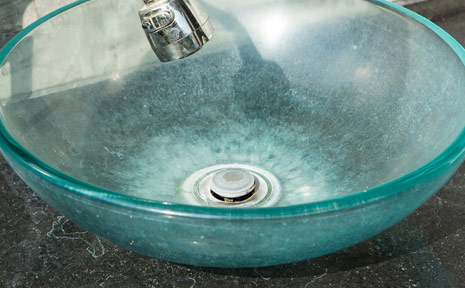 Hard water occurs when there are a high level of minerals in the water that it dissolved while moving through the bedrock. The minerals most frequently found are calcium and magnesium. The presence of hard water can leave a residue on your dishware, hair, and hands. Hard water issues will also raise the cost of heating water, clog your home's pipes, and create buildup in your home appliances that reduce their lifespan.
Hard water occurs when there are a high level of minerals in the water that it dissolved while moving through the bedrock. The minerals most frequently found are calcium and magnesium. The presence of hard water can leave a residue on your dishware, hair, and hands. Hard water issues will also raise the cost of heating water, clog your home's pipes, and create buildup in your home appliances that reduce their lifespan.
Iron Staining
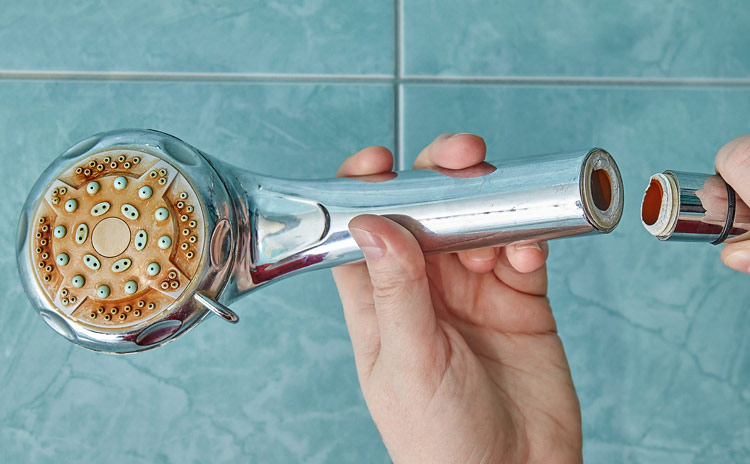 Iron is a natural substance found in the ground and as water passes by, it can't help but bring some iron along for the ride. Unfortunately, the water tends to leave it behind just as easily. Iron deposits can cause stubborn rust stains in your bathtub, toilet, sink, or even on your clothes during the wash cycle. If you have enough iron in your water, it can even taste metallic when you drink it. Iron can either be dissolved in your water so it's nearly undetectable to the naked eye, or it can be obvious brown particles that you can see when you fill a glass with water.
Iron is a natural substance found in the ground and as water passes by, it can't help but bring some iron along for the ride. Unfortunately, the water tends to leave it behind just as easily. Iron deposits can cause stubborn rust stains in your bathtub, toilet, sink, or even on your clothes during the wash cycle. If you have enough iron in your water, it can even taste metallic when you drink it. Iron can either be dissolved in your water so it's nearly undetectable to the naked eye, or it can be obvious brown particles that you can see when you fill a glass with water.
Chlorine
 If you live in a city, you can be certain there is chlorine added to your water. Municipal water treatment facilities must add this disinfecting chemical to ensure the water they provide is safe from bacteria growth as it travels to your home. Depending on how much chlorine they add, it may become a nuisance for you and your family. The harsh smell and taste are common complaints, but chlorine can also dry out your hair and skin leaving you itchy and irritated. Once the city's water has safely arrived to your door, this protective measure is no longer necessary and can be filtered before you ever step into the shower or pour your next glass of water.
If you live in a city, you can be certain there is chlorine added to your water. Municipal water treatment facilities must add this disinfecting chemical to ensure the water they provide is safe from bacteria growth as it travels to your home. Depending on how much chlorine they add, it may become a nuisance for you and your family. The harsh smell and taste are common complaints, but chlorine can also dry out your hair and skin leaving you itchy and irritated. Once the city's water has safely arrived to your door, this protective measure is no longer necessary and can be filtered before you ever step into the shower or pour your next glass of water.
Low pH
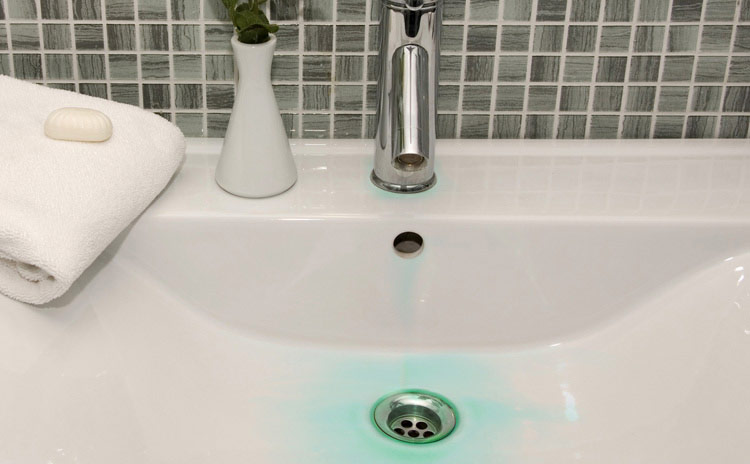 Water with a low pH can be disastrous for your home in several ways. It typically will be acidic, making it aggressively corrosive to your plumbing pipes and other water fixtures. Water with a low pH may also have traces of toxic metals that it has stripped from the pipes in your home. Homes suffering from acidic water may see blue-green stains on their sinks and toilets. This color comes from the fine particles of copper it leached from the metals that has oxidized after the water dried.
Water with a low pH can be disastrous for your home in several ways. It typically will be acidic, making it aggressively corrosive to your plumbing pipes and other water fixtures. Water with a low pH may also have traces of toxic metals that it has stripped from the pipes in your home. Homes suffering from acidic water may see blue-green stains on their sinks and toilets. This color comes from the fine particles of copper it leached from the metals that has oxidized after the water dried.
Hydrogen Sulfide
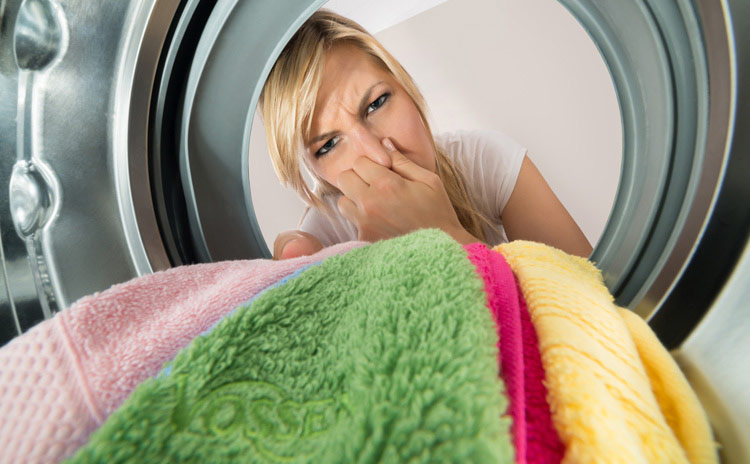 This common water problem will have a very distinct foul odor, often described as "rotten eggs". Hydrogen sulfide is a gas that is trapped inside your water. As the water exits your faucets and shower heads, the stinky gas is released into the air. Not only is this water not appealing to drink, but it can also cause problems for your home's plumbing system, while developing greasy and dark stains throughout your home.
This common water problem will have a very distinct foul odor, often described as "rotten eggs". Hydrogen sulfide is a gas that is trapped inside your water. As the water exits your faucets and shower heads, the stinky gas is released into the air. Not only is this water not appealing to drink, but it can also cause problems for your home's plumbing system, while developing greasy and dark stains throughout your home.
These common water problems can easily be detected with water testing from a WaterCare® professional and treated with our industry-leading systems. Not only will we identify and remove contaminants, but we will also prevent those contaminants from impacting your water in the future. You and your family deserve clean water, and our top priority is seeing that through. Allow us to give you peace of mind with water that is good for life.
Our In-Home Water Tests
When our technicians arrive at your home, they will evaluate your water and perform a water test following your needs. Each of our professionals carries in-home testing kits that hold multiple components to give you the best results possible.
Our Water Testing Kits allow technicians to test for the following:
- Hardness
- TDS
- Sulfur
- Iron
- pH imbalance
- Nitrates
- Manganese
- Chlorine
If required, our Deluxe Water Testing Kits test for:
- Coliform & E-Coli Bacteria
- Lead
- Copper, Mercury, Nickel, and other metals
- PFOA/PFOS (Gen X) Chemicals
- Arsenic
- Iron Bacteria
- Fluoride
If lead or bacteria ends up being a major concern, our technicians will collect a sample and send it to our specialized, third-party laboratory. There they will conduct a thorough breakdown of the issues and provide you the results.
*Sending out the sample for a more in-depth analysis are add-on services not included in the complimentary in-home testing that dealers provide.
How Our Complimentary Water Testing Works
Are you interested in learning more about what is in your water? Let WaterCare help you make water treatment a worry-free experience. Our local water experts will walk you through from start to finish.
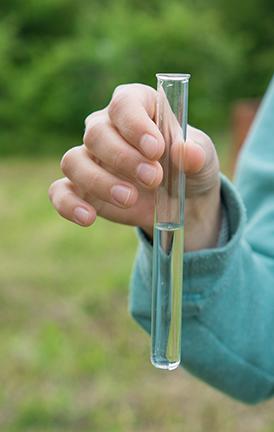
-
Initial discussion: During this conversation, we'll discuss your water needs and the number of people in the household. We also ask preliminary questions regarding your concerns. Our technician will go in-depth about the possible symptoms of the water problems you're experiencing and their causes.
-
Checking your existing water treatment: Next, our water testing expert will review the source of your water and how it enters your home. If you decide to purchase any water treatment system, the technician will be looking for the best place to install the equipment and explain what you can expect during that process.
-
Diagnosing your water: A water sample will be collected from where the water enters your home to test the untreated water. The technician will also be checking for any signs of foul odors or staining caused by your water throughout your home. Rust colored build up from iron, blue-green stains caused by acidic water, or white crusty film from hardness can all point to the need for water treatment. In the United States, 85% of homes are dealing with hard water build-up that is often left untreated.
-
Water tests: After the visual inspection, it's time to check the actual levels of the contaminants in question. Our experts collect any additional water samples and begin a series of tests that tell them how concentrated the water issues are - the more contamination, the more capacity your water softener, conditioner, or filter will need to have. Our tests detect hardness, acidity, iron, total dissolved solids, sulfur, and more.
-
Review: Once the technician has finished their testing and evaluation of your home's water, they will proceed to give you options on water treatment equipment or services to best handle the contaminants they found, if any. Further testing samples sent to a lab, can take about a week to return so some recommendations may need to wait until those results are complete. Understanding what is in your water and the proper way to remove it can be complicated, but our WaterCare dealers will help explain it every step of the way to make sure you are comfortable with the process.
Getting your water tested can improve the taste of your water, keep your family healthy, and overall provide you with a quality water supply you can trust. Click here to find a dealer near you!
FAQ
There are many ways that chemicals or bacteria can get into our drinking water, such as:
- Naturally occurring substances
- Local land-use practices (Fertilizers, pesticides, livestock, etc.)
- Broken well caps or casings
- Nearby industrial manufacturing
- Overflow from sewage
- Malfunctioning wastewater treatment facilities
If you are worried about bacterial or chemicals unexpectedly mixing with your water source, your local WaterCare dealer can recommend certified water filters and ultraviolet solutions to protect the health and safety of you and your family.
Most water testing kits available on the retail market are reasonably accurate. Although, when a technician collects the sample and performs their test for the same material, they are using a more advanced chemical reaction than your average paper test strip. This gives them more accurate results to provide you the best recommendation and service. Samples that are sent to the lab will provide a more detailed report and may be even more accurate that what can be done inside your home.
There are many different types of water testing options ranging from a simple at-home water testing kit that you can do yourself to a technician collecting a sample, doing an evaluation, and sending the information off to the lab. The right water test for you will depend on what you are looking to find out. Many retail D.I.Y. test just give a general ballpark of if you have that contaminant in your water; this may not be enough information to properly decide on what type or size of water treatment equipment is necessary. Our WaterCare experts can not only provide more accurate results, but then give you the guidance to understand what to do with that information.
Testing your water is important to know if there is anything harmful that you may be drinking. If someone in the home is pregnant, elderly, or a newborn, they are at a higher risk for some contaminants, like nitrates. While not all contaminants are a health concern, knowing that your water contains a lot of calcium, magnesium, iron, or manganese is the first step to preventing your pipes, water heater, and water-using appliances from breaking down at a faster rate or clogging from their damaging effects.
Ideally, you'll want to test water every year for a complete understanding of what is in your water. Any changes to the outside environment can change what your water picks up along the way and brings inside your house. Checking on your water quality regularly means you are in a better position to prevent the damaging effects of these contaminants before they get too far out of hand. If you have a new well or recently installed new pipes, you should get it tested as soon as possible as these factors can change your water quality.
During an on-site water test, your local WaterCare® dealer will provide a consultation to evaluate and address water quality issues and household needs. Here is what to expect:
- An introductory discussion covers your water needs, the number of people in the household, and preliminary questions to determine your concerns. The technician will also discuss possible symptoms of water quality issues and their causes.
- The technician will examine the water source and how it enters the home. They will also see the best place to install water treatment equipment and explain what to expect during that process if you choose to purchase equipment.
- They perform water testing by collecting samples from where water enters the home. They will also look for any foul odors or stains caused by water throughout the home, including rust-colored build-up from iron, blue-green stains caused by acidic water, or white crusty film from hardness.
- They check the levels of contaminants in your water with a series of tests that tell them how concentrated the issues are—the more contamination, the more capacity your water softener, conditioner, or filter will need. Our tests detect hardness, acidity, iron, total dissolved solids, sulfur, etc.
- Once the water test and evaluation are complete, they will recommend water treatment equipment or services to meet your needs. However, if they send additional samples to a lab, it can take up to a week for results and feedback on system suggestions. The bottom line is that they will help you understand what is in your water and how to remove contaminants, simplifying the process!
 Iron is a natural substance found in the ground and as water passes by, it can't help but bring some iron along for the ride. Unfortunately, the water tends to leave it behind just as easily. Iron deposits can cause stubborn rust stains in your bathtub, toilet, sink, or even on your clothes during the wash cycle. If you have enough iron in your water, it can even taste metallic when you drink it. Iron can either be dissolved in your water so it's nearly undetectable to the naked eye, or it can be obvious brown particles that you can see when you fill a glass with water.
Iron is a natural substance found in the ground and as water passes by, it can't help but bring some iron along for the ride. Unfortunately, the water tends to leave it behind just as easily. Iron deposits can cause stubborn rust stains in your bathtub, toilet, sink, or even on your clothes during the wash cycle. If you have enough iron in your water, it can even taste metallic when you drink it. Iron can either be dissolved in your water so it's nearly undetectable to the naked eye, or it can be obvious brown particles that you can see when you fill a glass with water.![Home Water Testing by WaterCare® in [state]](https://cdn.treehouseinternetgroup.com/cms_images/2392/TestingWC.jpg)
 Hard water occurs when there are a high level of minerals in the water that it dissolved while moving through the bedrock. The minerals most frequently found are calcium and magnesium. The presence of hard water can leave a residue on your dishware, hair, and hands. Hard water issues will also raise the cost of heating water, clog your home's pipes, and create buildup in your home appliances that reduce their lifespan.
Hard water occurs when there are a high level of minerals in the water that it dissolved while moving through the bedrock. The minerals most frequently found are calcium and magnesium. The presence of hard water can leave a residue on your dishware, hair, and hands. Hard water issues will also raise the cost of heating water, clog your home's pipes, and create buildup in your home appliances that reduce their lifespan.
 If you live in a city, you can be certain there is chlorine added to your water. Municipal water treatment facilities must add this disinfecting chemical to ensure the water they provide is safe from bacteria growth as it travels to your home. Depending on how much chlorine they add, it may become a nuisance for you and your family. The harsh smell and taste are common complaints, but chlorine can also dry out your hair and skin leaving you itchy and irritated. Once the city's water has safely arrived to your door, this protective measure is no longer necessary and can be filtered before you ever step into the shower or pour your next glass of water.
If you live in a city, you can be certain there is chlorine added to your water. Municipal water treatment facilities must add this disinfecting chemical to ensure the water they provide is safe from bacteria growth as it travels to your home. Depending on how much chlorine they add, it may become a nuisance for you and your family. The harsh smell and taste are common complaints, but chlorine can also dry out your hair and skin leaving you itchy and irritated. Once the city's water has safely arrived to your door, this protective measure is no longer necessary and can be filtered before you ever step into the shower or pour your next glass of water. Water with a low pH can be disastrous for your home in several ways. It typically will be acidic, making it aggressively corrosive to your plumbing pipes and other water fixtures. Water with a low pH may also have traces of toxic metals that it has stripped from the pipes in your home. Homes suffering from acidic water may see blue-green stains on their sinks and toilets. This color comes from the fine particles of copper it leached from the metals that has oxidized after the water dried.
Water with a low pH can be disastrous for your home in several ways. It typically will be acidic, making it aggressively corrosive to your plumbing pipes and other water fixtures. Water with a low pH may also have traces of toxic metals that it has stripped from the pipes in your home. Homes suffering from acidic water may see blue-green stains on their sinks and toilets. This color comes from the fine particles of copper it leached from the metals that has oxidized after the water dried. This common water problem will have a very distinct foul odor, often described as "rotten eggs". Hydrogen sulfide is a gas that is trapped inside your water. As the water exits your faucets and shower heads, the stinky gas is released into the air. Not only is this water not appealing to drink, but it can also cause problems for your home's plumbing system, while developing greasy and dark stains throughout your home.
This common water problem will have a very distinct foul odor, often described as "rotten eggs". Hydrogen sulfide is a gas that is trapped inside your water. As the water exits your faucets and shower heads, the stinky gas is released into the air. Not only is this water not appealing to drink, but it can also cause problems for your home's plumbing system, while developing greasy and dark stains throughout your home.

